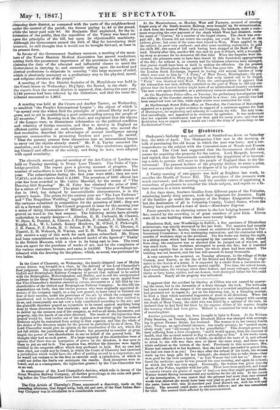be iihebinces.
Shakspere's birthday was celebrated at Stratford-on-Avon on Saturday' last, the 24th of April. The Shaksperian Club met in the morning, to talk of purchasing the old house in which the poet was born; and a cor- respondence on the subject with the Commissioners of Woods and Forests was read. The Club had suggested that the Government should take means for acquiring the property for the nation. Lord Morpeth, however, had replied, that the Government considered the acquisition of so interest- ing a relic to pertain still more to the people of England than to the Go- vernment! The present holders of the property decline to name a price, but announce their determination to dispose of it by public competition.
A Vestry meeting of rate-peyers was held at Brighton last week, to consider the Health of Towns Bill. The provisions of the measure were much canvassed; and the meeting took the sensible course of appointing a, committee of gentlemen to consider the whole subject, and report on as fu- ture occasion to a town meeting.
A few days since, fourteen families from different parts of the Pcittestes, numbering nearly sixty persons, took their departore for America. Eight of the families go under the auspices of the Potters Emigration Souiepal but the destination of all is Columbia County, United States, where the Society have purchased a tract of lancL—Manchester Express.
Fever prevails to an alarming extent iu the low lodging-houses of Hali- fax; caused by the crowding in of great numbers of poor Irish. Elevea were ill in one building where there were twenty lodgers.
Brandeston Hall, near Woodbridge in Suffolk, a fine specimen of Elizabethan architecture' was utterly destroyed by fire last week. The mansion had recently been purchased by Mr. Austin, the counsel so celebrated for his practice in Par- liamentary Committees: it was undergoing restoration; and the contractor with a number of workmen slept on the premises. The fire broke out daring the night, in a sitting-room which had been occupied by the contractor: on being roused. from sleep, the contractor was so alarmed that lie jumped out of window, and was much hurt- The workmen attempted to arrest the fire; but it travelled with such rapidity that in three hours the whole place had been rained. The building was not insured, and the loss will amount to many thousands.
A very extensive fire occurred, on Tuesday afternoon, in the village of Stoke Cannon, near Exeter, on the line of the Bristol and Exeter Railway. It origi- nated in the thatch of a house, it is supposed by a cinder from a locomotive en- gine falling upon it; and the flames spread rapidly. Two inns, the school-house, wool-warehouses, the vicarage, three other houses, and many cottages, with aome thirty or forty barns, stables, and out-houses, were destroyed before the fire,coald be arrested. Nearly all the property was uninsured.
It appears that the accident by blasting at Clifton was not caused by quarry- ing the stone, but in the formation of a drain through the rock. The workman had been warned of the danger of the operation in a crowded neighbourhood, and had promised not to repeat it; yet on the following day, in a bungling manner, he fired a blast which scattered fragments of stone in all directions. When the man, John Millard, was taken before the Magistrates and charged with causing the death of Mary Casey, the child who was killed by a splinter of the rock, he declared that he had fired the-blast by the express orders of his master, despite the warning which had been given. Millard is committed for trial on a charge of manslaughter.
Another poisoning case has been brought to light in Essex. At the Witham Petty Sessions, on 'Tuesday, Emma Elizabeth Home was charged with attempt- ing to poison Thomas Hume her husband. The woman is in her twenty-fourth year; Thomas, an agriculturist labourer, was nearly seventy; he "seemed exces- sively weak," and "old enough to be her grandfather." This decrepit person had, been suffering from a liver complaint, "audit would appear, from his constant ill health, that the accused seemed to flag in attending on him." A few weeks since, the woman offered Hume a basin of broth; he disliked the taste of it, and refused to drink it; the wife was then seen to throw the mess away, and there MO a white sediment at the bottom of the bowl. Previously to this occurrence, Mrs. Hume had remarked to her husband, that she had been persuaded to poison him, but had not done it as yet! Two days after the refusal of the broth, the woman made up two large pills for her husband; she desired him to take them—they were good for the liver complaint, "as Tom Warner had told her so." Hume re- fused the medicine: again he was pressed the next morning, and again he refused; at which the wife was very angry. Eventually, the woman was given into the hands of the Police, together with her pills. These have been analyzed, and found to contain twenty-six grains of sugar of lead,—a dose that might produce death. Warner denied having recommended any medicine for the old man. In the course of the investigation, it VMS stated that the prisoner had more than once uttered words that showed she would have been very glad to get rid of her husband. In the same house with this ill-matched pair lived Home's son, with his wife and family. The accused could make no available defence; and she was committed for trial. She seemed little affected by the announcement.


























 Previous page
Previous page